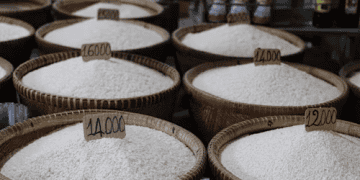A House of Representatives committee has raised concerns over potential market manipulation by leading rice importers and traders, despite an oversupply of rice and reduced import tariffs under Executive Order (EO) 62.
During a session of the House “Murang Pagkain Supercommittee,” Albay Representative Joey Salceda presented findings suggesting speculative practices in rice importation, including inflated commercial inventories, delays in withdrawals, and import volumes exceeding projections by the United States Department of Agriculture (USDA).
“The committee focused on top importers due to signs of speculation, such as swelling inventories and imports surpassing projected needs,” Salceda noted.
The committee highlighted market concentration among the top 10 importers, which control 36% of total rice imports. Among these were companies such as Bly Agri Venture Trading, Atara Marketing, Inc., and RBS Universal Grains Traders Corp., with some firms allegedly linked through shared ownership structures that could facilitate coordinated pricing strategies.
Marikina Representative Stella Quimbo pointed to government data showing a decline in the demand-to-supply ratio from 82.5% in 2023 to 69% in 2024, indicating an oversupply of rice. Despite this, domestic rice prices rose from PHP51 to PHP55.30 per kilogram over the past year, even as the landed price of imported rice fell by PHP11 per kilogram.
“There is clearly an oversupply. Prices should have dropped, yet they increased instead. This indicates potential market manipulation,” Quimbo said.
Quimbo added that the profit margin between imported and domestic rice prices widened from PHP3 per kilogram in 2023 to PHP20 per kilogram in 2024, suggesting coordinated efforts to withhold stocks and drive up prices. She estimated that importers and traders profited by approximately PHP13 billion due to reduced tariffs.
Tax Compliance Concerns
The committee also urged the Bureau of Internal Revenue (BIR) to investigate tax discrepancies among top importers, whose billion-peso import volumes do not align with their reported tax payments.
“While Congress cannot access tax filings due to confidentiality protections, the BIR can assess its own records to ensure compliance,” Salceda stated, adding that tax evasion could serve as grounds for further investigation by the Anti-Money Laundering Council.
Get the newest supply chain report news updates at The Supply Chain Report. Interested in international trade? Check out ADAMftd.com for free tools.
#RiceMarket #TariffImpact #EconomicTransparency #SupplyChainNews #ConsumerProtection















